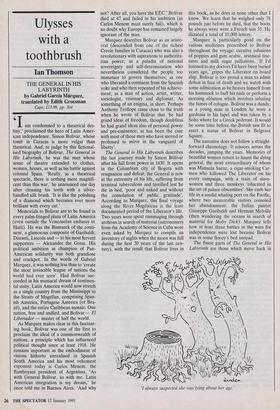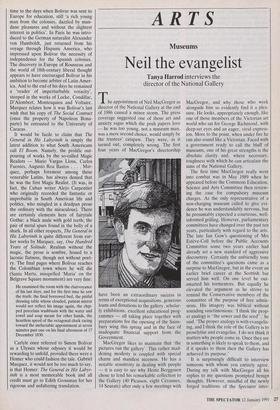Ulysses with a toothbrush
Ian Thomson
THE GENERAL IN HIS LABYRINTH by Gabriel Garcia Marquez, translated by Edith Grossman Cape, £13.99, pp. 304 Iam condemned to a theatrical des- tiny,' proclaimed the hero of Latin Amer- ican independence, Simon Bolivar, whose tomb in Caracas is more vulgar than theatrical. And, to judge by this fictional- ised biography of Bolivar, The General in His Labyrinth, he was the man whose sense of theatre extended to clothes, women, horses, as well as his battle against colonial Spain. 'Really, as a theatrical spectacle, there is nothing more magnifi- cent than this war,' he announced one day after cleaning his teeth with a silver- handled silk brush. 'It is like the polishing of a diamond which becomes ever more brilliant with every cut.'
Memorials to Bolivar are to be found in every palm-fringed plaza of Latin America (even outside the Venezuelan embassy in Haiti). He was the Bismarck of the conti- nent, a glamorous composite of Garibaldi, Disraeli, Lincoln and — to his most fervent supporters — Alexander the Great. His political ambition as champion of Pan- American solidarity was both grandiose and crackpot. In the words of Gabriel Marquez, it was nothing less than to 'create the most invincible league of nations the world had ever seen'. Had Bolivar suc- ceeded in his maniacal dream of continen- tal unity, Latin America would now stretch as a single country from the Mississippi to the Straits of Magellan, comprising Span- ish America, Portugese America (or Bra- zil), and the entire Caribbean mosaic. One nation, free and unified, and Bolivar — El Libertador — master of half the world.
As Marquez makes clear in this fascinat- ing book, Bolivar was one of the first to proclaim the ideal of a commonwealth of nations, a principle which has influenced political thought since at least 1918. He remains important as the embodiment of visions hitherto unrealised in Spanish South America and his most vehement exponent today is Carlos Menem, the flamboyant president of Argentina. 'As with General Bolivar, so with me. Latin American integration is my dream,' he once told me in Buenos Aires. 'And why not? After all, you have the EEC.' Bolivar died at 47 and failed in his ambition (as Carlos Menem must surely fail), which is no doubt why Europe has remained largely ignorant of the man.
Marquez describes Bolivar as an aristo- crat (descended from one of the richest Creole families in Caracas) who was also a revolutionary with aspirations to authorita- rian power; as a paladin of national sovereignty and self-determination who nevertheless considered the people too immature to govern themselves; as one who liberated a continent from the Spanish yoke and who then repented of his achieve- ment; as a man of action, artist, writer, sociologist, visionary and diplomat. As something of an enigma, in short. Perhaps Anthony Trollope came close to the truth when he wrote of Bolivar that 'he had grand ideas of freedom, though doubtless he had grand ideas also of personal power and pre-eminence; as has been the case with most of those men who have moved or professed to move in the vanguard of liberty'.
The General in His Labyrinth describes the last journey made by Simon Bblivar after his fall from power in 1830. It opens in the Colombian city of Bogota with resignation and defeat; the General is now at the extremity of his life, suffering from terminal tuberculosis and terrified lest he die in bed, 'poor and naked and without the consolation of public gratitude'. According to Marquez, this final voyage along the River Magdalena is the least documented period of the Liberator's life. Two years were spent rummaging through archives in search of material (astronomers from the Academy of Science in Cuba were even asked by Marquez to compile an inventory of nights when the moon was full during the first 30 years of the last cen- tury), with the result that Bolivar lives in this book, as he does in none other that I know. We learn that he weighed only 78 pounds just before he died, that the boots he always wore were a French size 35. He dictated a total of 10,000 letters.
Marquez is particularly good on the various medicines prescribed to Bolivar throughout the voyage: curative infusions of poppies and gum arabic, arsenical tinc- tures and milk sugar palliatives. 'If I'd listened to my doctors I'd have been buried years ago,' gripes the Liberator on board ship. Bolivar is too proud a man to admit defeat in face of death and we watch with some admiration as he heaves himself from his hammock to buff his nails or perform a morning ablution which involves inhaling the fumes of cologne. Bolivar was a dandy; as a young man in London he wore a gardenia in his lapel and was taken by a Soho whore for a Greek pederast. It would be some time before the British saw fit to erect a statue of Bolivar in Belgrave Square.
The narrative does not follow a straight- forward chronology. It scissors across the decades, jumping the years. Memories of beautiful women return to haunt the dying general, the most extraordinary of whom was Manuela Saenz, a cigar-smoking Car- men who followed The Liberator on his every campaign, with a train of slave- women and three monkeys 'educated in the art of palace obscenities'. She ends her life in a sordid whaling port on the Pacific, where two memorable visitors consoled her abandonment: the Italian patriot Giuseppe Garibaldi and Herman Melville (then wandering the oceans in search of material for Moby Dick). Marquez tells how at least three battles in the wars for independence were lost because Bolivar was in some floozy's bed instead.
The finest parts of The General in His Labyrinth are those which move back in `I always suspected she was lying about her age.' time to the days when Bolivar was sent to Europe for education, still 'a rich young man from the colonies, dazzled by mun- dane pleasures and without the slightest interest in politics'. In Paris he was intro- duced to the German naturalist Alexander von Humboldt, just returned from his voyage through Hispanic America, who impressed upon Bolivar the necessity of independence for the Spanish colonies. The discovery in Europe of Rousseau and the world of 18th-century liberal thought appears to have encouraged Bolivar in his ambition to become arbiter of Latin Amer- ica. And to the end of his days he remained a 'reader of imperturbable voracity', steeped in the works of Locke, Condillac, D'Alembert, Montesquieu and Voltaire. Marquez relates how it was Bolivar's last wish that his copy of The Social Contract (once the property of Napoleon Bona- parte) be entrusted to the University of Caracas.
It would be facile to claim that The General in His Labyrinth is simply the latest addition to what South Americans call El Boom. Namely, the prolific out- pouring of works by the so-called Magic Realists — Mario Vargas Llosa, Carlos Fuentes, Augusto Roa Bastos . . . . Mar- quez, perhaps foremost among these venerable Latins, has always denied that he was the first Magic Realist. (It was, in fact, the Cuban writer Alejo Carpentier who originally recorded the fantastic or improbable in South American life and politics, who mingled in a deadpan prose the ordinary with the miraculous). There are certainly elements here of fairytale Gothic: a black mule with gold teeth; the pair of metal spurs found in the belly of a shark. In all other respects, The General in His Labyrinth is quite different from ear- lier works by Marquez, say, One Hundred Years of Solitude. Realism without the magic, the prose is sombre, honed to a laconic flatness, though not without poet- ry. The final pages where Bolivar reaches the Colombian town where he will die (Santa Marta, misspelled 'Maria' on the Belgrave Square monument) are very fine:
He examined the room with the clairvoyance of his last days, and for the first time he saw the truth: the final borrowed bed, the pitiful dressing table whose clouded, patient mirror would not reflect his image again, the chip- ped porcelain washbasin with the water and towel and soap meant for other hands, the heartless speed of the octagonal clock racing toward the ineluctable appointment at seven minutes past one on his final afternoon of 17 December 1830.
Carlyle once referred to Simon Bolivar as a Ulysses whose odyssey it would be rewarding to unfold, provided there were a Homer who could fashion the tale. Gabriel Marquez, it would not be too much to say, is that Homer: The General in His Labyr- inth is a most memorable book and all credit must go to Edith Grossman for her rigorous and unfaltering translation.











































 Previous page
Previous page